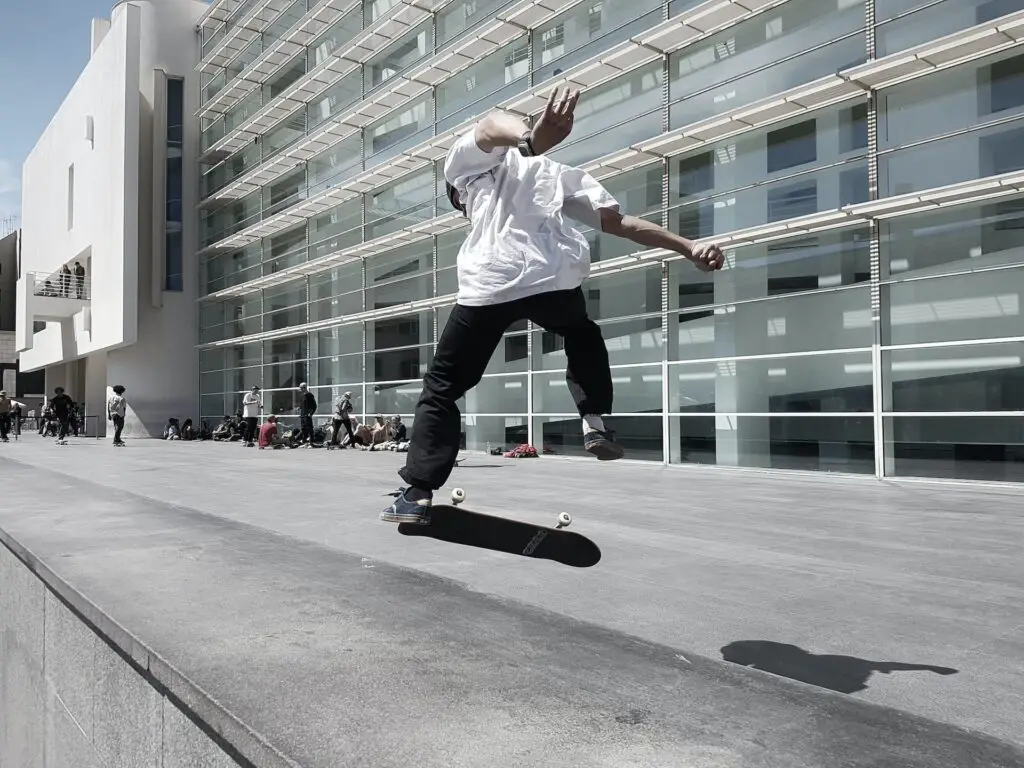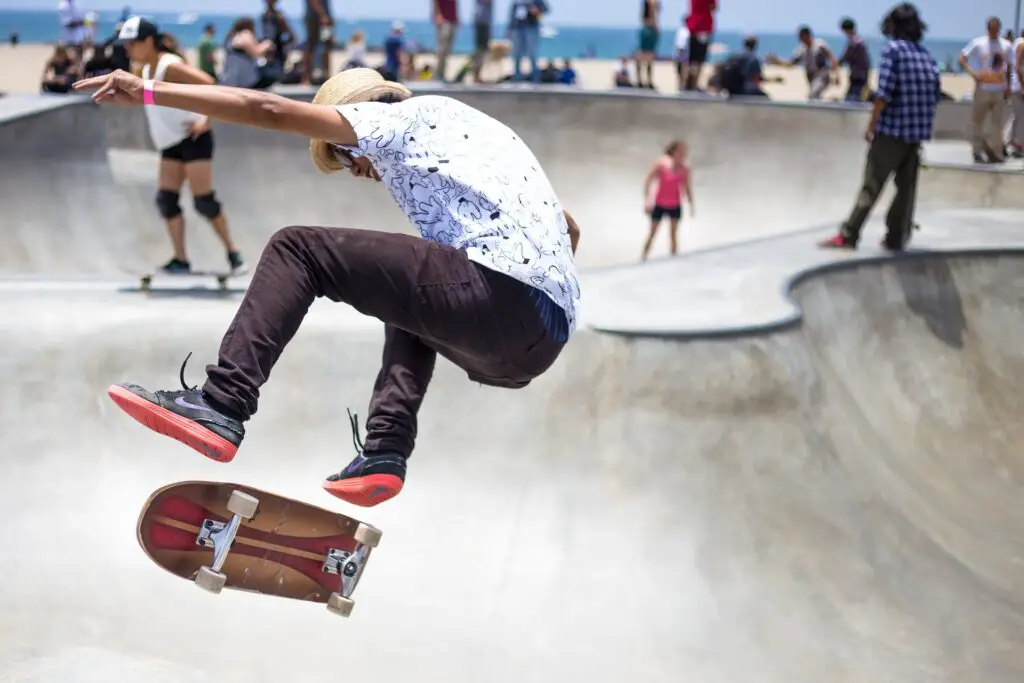
As we know, skateboards are pretty cool. They’re fun to do and you can make some good money off of them if you market yourself properly.
But one thing that may put a damper on your love for skating is the fact that it is not allowed in public spaces.
Many cities have banned skateboarding from their streets due to safety concerns or worries about vandalism. Some even ban all types of wheels except for smooth ones!
This article will talk more in-depth about why this practice is really annoying, and why Is skateboarding not allowed In public Places? And how to get around it. So stay tuned and read on!
Some people see skateboards as a safety hazard
Many people perceive skateboarders to be reckless individuals who are too focused on having fun to pay attention to their surroundings. This is not always the case, however.
Skateboarders take many precautions when riding or doing anything else with a board. They will frequently check that the area is clear of obstacles before trying something new, for example.
More often than not, they will try to find an open space away from heavy traffic so that they do not have to worry about being hit by a car.
Why street skating is such a big problem?
Furthermore, even if there are no cars around, they will still use common sense and avoid any risk of accidents by only going at night or during off-hours.
These things can easily be avoided, though, which is what makes it difficult for some to understand why street skating is such a big problem.
There have been several cases where skateboarders were injured due to poor road conditions or unsafe behavior, but this happens very rarely.
Most importantly, even if a few bad apples exist, this does not justify banning all forms of no skateboarding just because they feel uncomfortable or scared for some riders.
It is important to remember that personal preference is one of the main reasons why someone might choose to learn how to ride to skateboard in private and public parks.
What is illegal, unfortunately, is intentionally throwing your board down or walking away while it is rolling.
Skateparks are hard to find
Finding a good skatepark can be tricky, especially outside of major metropolitan areas. There have been many attempts to start up urban design skateparks before fizzling out due to a lack of interest or funding.
Most people enjoy going to the beach or pool once in a while, so why not make our own beaches and pools by having an organized place to skate event? This could potentially create a sense of community and understanding for skaters all around!
Allow skateboarding law
However, this isn’t possible without legalizing skateboarding as a sport first. Currently, it is illegal to ride a board down any road, or skateboard on the sidewalk, street, or another paved surface area.
It is also against the law to use a board as either a vehicle or a weapon. Skateboarding laws and rules were put into place because of safety concerns. If someone doesn’t want you to do something, they will try to stop you!
This article will talk about some reasons why legalizing skateboarding as a sport would help promote social interaction, fitness, and self-expression.
Also, how organizing such events would bring in much-needed revenue to cities that support them.
Why sports are important
Popular sports play a huge part in our society. They teach us about teamwork, discipline, responsibility, and how to achieve goals.
They contribute to the local economy, creating jobs and spending money at sporting goods stores.
Not only that, but they give people a way to release their stress and energy.
There are many sports that are not allowed in public places
Let’s take a look at some of these sports and why they’re not allowed in certain locations. Can you guess which ones?
Ride a skateboard bylaw
Skating is one of those sports. It is completely illegal to skate anywhere other than your own home, or somewhere with private property. This includes sidewalks, street courses, parks, etc.
Why is this rule in place? Because most municipalities do not want people skating on streets or outdoor spaces because it can be dangerous for drivers.
Many inexperienced skaters don’t know how to handle traffic and road conditions, so staying safe is very difficult.
Luckily there are ways to enjoy skateboarding outside, but you will have to be aware of the rules.
People think skaters are a risk to others
Many people believe that skateboards pose a threat to other pedestrians or car drivers when they collide. This is not always the case, however!
Skateboarders do take some risks by performing tricks on their boards, but this only happens for a few seconds at a time.
When these things happen there’s no way of knowing if it was because someone didn’t like how they were skating or whether they just don’t use common sense.
There have been cases where skateboarders have hurt themselves or somebody else due to reckless maneuvers, but this is very rare.
You may damage property
As we know, skateboards are not totally portable. You have to choose between having wheels or having a board. If you do not own a house at this moment, hopefully, one will come your way soon!
If there is no place for people to park their boards, then they must be left outside or in a garage. This is very expensive if you live in an area with popular parks like beaches or lakes.
You would have to pay extra to leave your board somewhere, which most likely does not exist anywhere close by. Therefore, many people feel that it is illegal to practice skateboarding in public places because of this.
Some cities actually charge a fee per hour to use a parking place to go near a beach or pool where skateboarders can park their boards.
The government may get sued
In 2006, the United States Senate passed an amendment that would have banned skateboards from being ridden on public sidewalks and streets.
The Congressional vote was 52 to 50 with all but one senator voting yes. Fifty votes are more than enough to pass an amendment in the U.S. Congress!
But twenty years later this law still hasn’t gone into effect because some people are willing to fight it out in court.
In fact, two major lawsuits were filed just last month alone! One lawsuit was filed against the City of Los Angeles for allowing illegal sidewalk board riding within its city limits and the other was filed by the Federal Government accusing individuals of illegally street boarding across state lines.
If you ever feel like fighting or suing over something, make sure your legal team checks if there have been cases like yours before so they are not surprised when you bring up the argument.
You may trespass the law
Why is skateboarding not allowed in public places? It seems like such an innocuous activity, but it’s actually illegal to do some things while skateboarding.
The main offense is usually breaking the law by performing tricks on sidewalks or streets.
There are also instances where people have illegally operated their vehicles with excessive speed to catch a glimpse of a skater doing the trick, or using them as cover when they perform a trick.
Both of these offenses can result in substantial fines for violations of the rules!
Another major reason why skateboards are banned in certain areas is that many cities claim that they pose a risk to pedestrians.
While there has never been any verified evidence proving this to be true, most police departments assume that it is due to the fact that many novice riders lack understanding of how to properly handle their board.
Some believe that even if no one was hurt, then educating young people about safety could still prevent injuries down the road.
There are many children who skateboard
Many people enjoy skating as an activity. Some of these individuals make it their career, traveling across the country to compete in events while others just love doing it for fun.
One of the greatest things about skating is how accessible it can be to anyone at any time.
You do not need very expensive equipment to get started. You also do not have to live near a beach or river to practice your skills.
Because skating does not require too much technology or machinery, you will find lots of places where you can go to practice.
However, because most locations ban skates from being used there, some people may feel limited in what they can do. This could prevent them from practicing or even quitting board sports completely.
why is skateboarding illegal in public places?
Skateboarding in public places is illegal because it can be dangerous to both the skateboarder and bystanders. Without proper safety gear, a skater can easily get injured if they fall or crash into someone else.
Additionally, skateboards can cause damage to property, such as scratching up the sidewalks or leaving wheel marks on walls.
Further, skateboarding can be disruptive to pedestrians and traffic, blocking pathways and presenting a hazard to others.
As a result, many cities have taken steps to limit or prohibit skateboarding in public locations for the safety of all involved.
Some may argue that banning skateboards makes sense since pedestrians cannot defend themselves against careless riders. But this only proves why more adults should learn how to skate!
For those who already know how to skate, public bans limit their ability to express themselves. It also prevents young kids with dreams of becoming professional skaters from getting exposed to the sport.
Should skateboarding be banned in public places pros and cons
Skateboarding is a popular activity that can be enjoyed in public places. However, it also has its drawbacks and some people feel that it should be banned from public places.
On the one hand, skateboarding can provide an enjoyable recreational activity for people of all ages and can help to promote physical health and energy.
On the other hand, skateboarders often can create noise pollution, put pedestrians at risk of injury and damage public property.
Ultimately, whether or not skateboarding should be banned in public places is a personal decision that should take into account both the pros and cons associated with it.
The pros include providing a fun recreational activity, while the cons include potential risks to safety and property damage.

Is it illegal to skateboard on public property?
Skateboarding on public property is a contentious issue.
Generally, skateboarding is not necessarily illegal on public property but it may be restricted in certain areas.
It is important to check with your local municipality before engaging in skateboarding activities as laws vary from place to place.
Local governments may outlaw skateboarding in parks and other public spaces for safety reasons or because of damage that boards may cause to the pavement and other structures.
In some cases, skateboarders must wear elbow pads, helmets, and other protective gear, while in other areas they may be prohibited from performing certain tricks or stunts.
Signs should be posted to indicate whether skateboarding on any given piece of public property is allowed or not.
It is important to understand the local laws before attempting to skateboard on public property, as failure to comply can result in fines or even arrest.
Conclusion
Skateboarding is a beloved and accessible activity enjoyed by people of all ages. However, it faces challenges when it comes to being allowed in public spaces. Some cities have banned skateboarding due to concerns about safety, property damage, and disruptions to pedestrians and traffic.
These bans can be frustrating for skateboard enthusiasts and limit their ability to express themselves. The debate surrounding whether skateboarding should be banned in public places has pros and cons, with recreational benefits on one hand and potential safety and property damage issues on the other.
Local laws and regulations regarding skateboarding on public property vary, so it’s important to be aware of and adhere to these rules to avoid fines or legal issues. Ultimately, finding a balance between accommodating skateboarders and ensuring public safety is an ongoing challenge for many communities.
Frequently Asked Questions(FAQ)
Is skateboarding a high-risk sport?
Skateboarding can be considered a high-risk sport due to the potential for falls and injuries, especially if safety precautions like helmets and pads are not used. However, with proper safety measures and training, the risk can be reduced, and skateboarding can be enjoyed safely.
Is skateboarding only for boys?
Skateboarding is not exclusive to boys; it’s a sport and recreational activity for people of all genders. Skateboarding is enjoyed by both boys and girls, and it promotes inclusivity and diversity within the skateboarding community.
Which law is skateboarding?
Skateboarding is subject to various local and municipal laws and regulations that dictate where and how it can be practiced. These laws may include rules about where skateboarding is allowed, safety gear requirements, and restrictions on certain tricks or stunts in public areas. Laws related to skateboarding can vary from one location to another.
Is skateboarding a sport yes or no?
Yes, skateboarding is considered a sport, but it is also a recreational and lifestyle activity for many.

